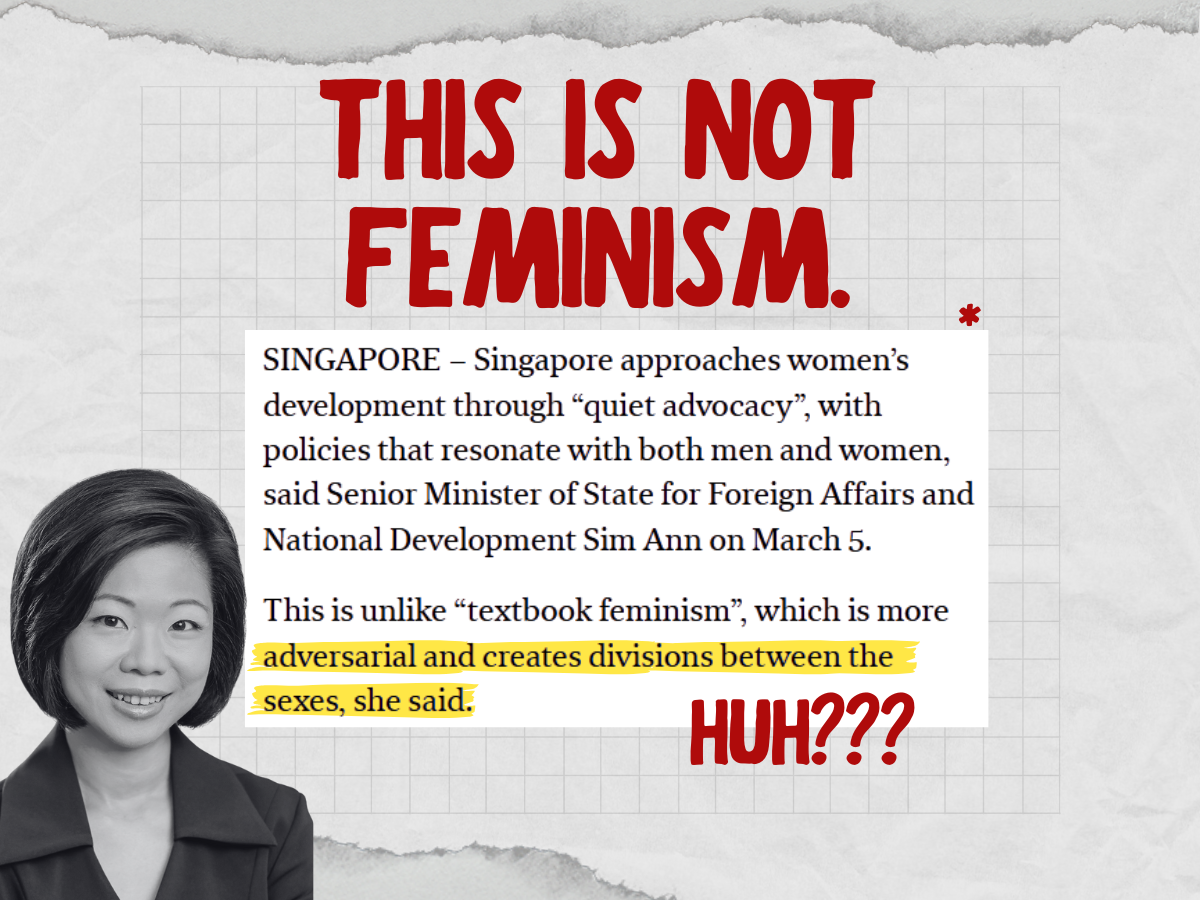-
Advocacy Theme
-
Tags
- Abortion
- Adoption
- Caregiving
- CEDAW
- Disability
- Domestic Violence
- Domestic Workers
- Harassment
- Healthcare
- Housing
- International/Regional Work
- Maintenance
- Media
- Migrant Spouses
- Migrant Workers
- Muslim Law
- National budget
- Parental Leave
- Parenthood
- Polygamy
- Population
- Race and religion
- Sexual Violence
- Sexuality Education
- Single Parents
- Social Support
- Sterilisation
- Women's Charter
Advocating for gender equality must not be seen as contentious
March 14th, 2025 | Letters and op-eds, News, Older People and Caregiving, Women in Leadership
Includes photograph of Sim Ann by a photographer working with Ministry of Communications and Information, with a Creative Commons License CC BY-SA 4.0. Includes screenshot of a Straits Times article by Tham Yuen-C.
This forum letter was originally published in The Straits Times on 14 March 2025.
The recent remarks by PAP Women’s Wing chair Sim Ann reflect views that reinforce gender stereotypes (Singapore forges own path to women’s development, says PAP Women’s Wing chair Sim Ann, March 9). Take for example her view that “by allowing eligible young couples to apply for Housing Board flats, women learn to run their own households from young”. Her comments reflect outdated gender norms that reinforce caregiving and household responsibilities as the woman’s burden.
We are also troubled by her description of feminism as divisive and adversarial. Why is feminism – an idea rooted in equality – seen as divisive? Feminism does not seek to advance women at the expense of men. It calls for fairness, shared responsibilities, and equal opportunities for all genders. If we are advocating for equality, why is that seen as contentious?
Beyond this, the idea that a key role of the PAP Women’s Wing is to “plan community activities, welcome newcomers and interact with constituents” signals a troubling view in the apex women’s body of the PAP about the role of women’s leadership. Women’s advocacy in such an important sphere should not be reduced to social hosting – it should be about shaping policies, especially those that advance gender equity.
The Prime Minister has acknowledged that women should not be pigeon-holed into these stereotypical roles. During his National Day Rally speech in 2024, he said that women these days “have every opportunity to excel in their careers. It’s not possible for them to pursue their goals and still carry a heavier share of the caregiving and housework responsibilities. So fathers must play a bigger role”.
He noted that deeply ingrained beliefs about men as “breadwinners” and women as “caregivers” must evolve. We would expect the Women’s Wing to lead the efforts on this front.
So, it was therefore disappointing to see this public interview, given to mark International Women’s Day, reinforce outdated roles instead of pushing for progress.
The United Nations Committee on the Convention on the Elimination of All Forms of Discrimination Against Women reminded Singapore in May 2024 that a country like ours should be aiming for 50 per cent representation in leadership roles, not comparing itself to the global average.
It would have been encouraging to see the Women’s Wing champion this push for equality, rather than simply celebrating the current number of women MPs (29 per cent) while accepting that leadership is still seen as a male domain.
When asked whether women ministers can take over portfolios like finance and defence, the Women’s Wing chair missed the opportunity to speak of the equal ability of women to do such jobs.
Women have made up half of Singapore’s graduates since 2013, yet only 15 per cent of our Cabinet ministers are women. Instead, Ms Sim talked about societal attitudes and how women today need to pave the way for others. This is indeed the pace of “quiet advocacy”.
The low total fertility rate in Singapore and many developed countries is no coincidence. Many women delay or opt out of marriage and motherhood not because they don’t want families, but because gender roles remain rigid, workplaces are slow to adapt, and caregiving remains undervalued. This is a societal issue, not a women’s issue.
Yet, the Women’s Wing’s advocacy plans for this year are focused on getting people to date, marry and procreate.
It would have been far more encouraging for women in Singapore to see the Women’s Wing focus on equal opportunities for women in the workplace, overcoming the “motherhood penalty” women face and push for retirement adequacy for women who are still bearing the unequal burden of caregiving.
The White Paper on Women’s Development spoke of a clear vision for gender equality in Singapore, one where women and men share opportunities and responsibilities equally.
But vision alone is not enough, and we need more than just “quiet advocacy” – we need clear commitments, stronger policies, and determined pushes for cultural shifts that reflect the reality of modern life and the aspirations of Singaporeans, both women and men.
Corinna Lim is the Executive Director of AWARE.




